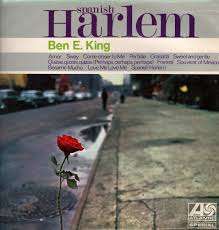Spanish Harlem (song)
"Spanish Harlem" is a song recorded by Ben E. King in 1960 for Atco Records. It was written by Jerry Leiber and Phil Spector and produced by Jerry Leiber and Mike Stoller. Leiber credited Stoller with the arrangement in a 1968 interview;[1] similarly, Leiber said in a 2009 radio interview with Leiber and Stoller on the Bob Edwards Weekend talk show that Stoller had written the key instrumental introduction to the record, although he was not credited. Stoller remarks in the team's autobiography Hound Dog that he had created this "fill" while doing a piano accompaniment when the song was presented to Ahmet Ertegun and Jerry Wexler at Atlantic Records, with Spector playing guitar and Leiber doing the vocal. "Since then, I've never heard the song played without that musical figure."[1]
| "Spanish Harlem" | ||||
|---|---|---|---|---|
 | ||||
| Single by Ben E. King | ||||
| from the album Spanish Harlem | ||||
| B-side | "First Taste of Love" | |||
| Released | December 1960 | |||
| Genre | Soul | |||
| Length | 2:53 | |||
| Label | Atco | |||
| Songwriter(s) |
| |||
| Producer(s) | Jerry Leiber and Mike Stoller | |||
| Ben E. King singles chronology | ||||
| ||||
It was originally released as the B-side to "First Taste of Love".[2] The song was King's first hit away from The Drifters, a group that he had led for several years. It climbed the Billboard charts with an arrangement by Stan Applebaum featuring Spanish guitar, marimba, drum-beats, soprano saxophone, strings, and a male chorus, and peaked at number 15 for rhythm and blues and number 10 in pop music.[3] It was ranked number 358 on Rolling Stone's list of the 500 Greatest Songs of All Time.[4] King's version was not a hit in the United Kingdom.[5] The song was re-released in 1987, after Stand By Me made number one.[5]
Aretha Franklin's version
- In 1971, Aretha Franklin released a cover version of the song that outperformed the original on the charts, in which Franklin changed the lyrics slightly: from "A red rose up in Spanish Harlem" to "There's a rose in Black 'n Spanish Harlem. A rose in Black 'n Spanish Harlem.” Her version went to #1 on the US soul charts for three weeks and #2 Pop for two weeks.[6] "Spanish Harlem" was kept from the #1 spot by Go Away Little Girl by Donny Osmond.[7] This version also hit #6 on Billboard's Easy Listening chart.[8] Aretha Franklin's version earned a gold single for sales of over one million. Dr. John played keyboards on Franklin's version with Bernard "Pretty" Purdie on drums and Chuck Rainey on bass.[9]
Cliff Richard versions
- Cliff Richard released a version on the 1962 album 32 Minutes and 17 Seconds. He also recorded a German version, titled "Das ist die Frage aller Fragen", with lyrics by Carl Ulrich Blecher, that was a #1 hit in Germany and Austria in 1963, and a #1 hit in Switzerland in 1965.
References
- Gilliland, John (1969). "Show 14 - Big Rock Candy Mountain: Rock 'n' roll in the late fifties. [Part 4] : UNT Digital Library" (audio). Pop Chronicles. Digital.library.unt.edu. Retrieved 2011-04-30.
- Billboard. Books.google.com. 1960-11-21. p. 53. Retrieved 2016-09-26.
- Whitburn, Joel (2004). Top R&B/Hip-Hop Singles: 1942-2004. Record Research. p. 325.
- "Rolling Stone's 500 Greatest Songs of All Time". Rolling Stone. April 7, 2011. Retrieved October 1, 2015.
- "The Official Charts Company - Spanish Harlem (song)". The Official Charts Company. 3 May 2013.
- Whitburn, Joel (2004). Top R&B/Hip-Hop Singles: 1942-2004. Record Research. p. 215.
- "Top 100 Songs | Billboard Hot 100 Chart". Billboard.
- Whitburn, Joel (2002). Top Adult Contemporary: 1961-2001. Record Research. p. 97.
- Warner, Jennifer (September 24, 2014). Respect: The Life and Times of Aretha Franklin. CreateSpace Independent Publishing Platform. p. 31. ISBN 978-1502500007. Retrieved 18 May 2015.